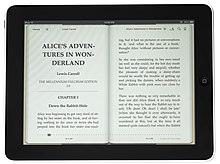Books, news, and magazine content
The iPad has an optional iBooks application that can be downloaded from the App Store, which displays books and other ePub-format content downloaded from the iBookstore.[78] For the iPad launch on April 3, 2010, the iBookstore is available only in the United States.[3][20][65] Several major book publishers including Penguin Books, HarperCollins, Simon & Schuster and Macmillan have committed to publishing books for the iPad.[79] Despite being a direct competitor to both the Amazon Kindle and Barnes & Noble Nook,[80] both Amazon.com and Barnes & Noble have made Kindle & Nook apps available for the iPad.[81][82]
In February 2010, Condé Nast Publications said it would sell iPad subscriptions for its GQ, Vanity Fair and Wired magazines by June.[83]
In April 2010, The New York Times announced it will begin publishing daily on the iPad.[84] As of October 2010, The New York Times iPad app is ad-supported and available for free without a paid subscription, but will transition to a subscription-based model in 2011.[85] Major news organizations, such asThe Wall Street Journal, BBC, and Reuters have released iPad applications, to varying degrees of success.[86]
Censorship
Apple's App Store, which provides iPhone and iPad applications, imposes censorship of content, which has become an issue for book publishers and magazines seeking to use the platform. The Guardian described the role of Apple as analogous to that of the distributor WH Smith, a main distributor which for many years imposed content restrictions on British publishers.[87]
Due to the exclusion of porn from the App Store, YouPorn and others changed their video format from Flash to H.264 and HTML5 specifically for the iPad.[88][89] In an e-mail exchange[90] with Ryan Tate from Valleywag, Steve Jobs claimed that the iPad offers "freedom from porn", leading to many upset replies including Adbustings in Berlin by artist Johannes P. Osterhoff[91] and in San Francisco during WWDC10.[92]
 Reading a book on the iPad
Reading a book on the iPad